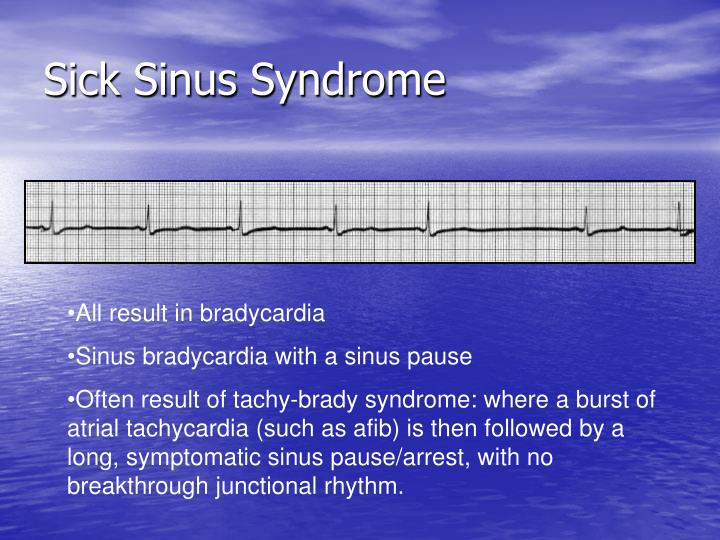

Making healthier lifestyle choices (diet, stress management, etc.) as recommended by your doctor, or through Elranger's Cardiac Rehabilitation Program.Having a radiofrequency ablation procedure.Controlling heart rhythm and pace with a pacemaker.Tests that help determine the cause include: Sick Sinus Syndrome can be hard to diagnose because symptoms are similar to other diseases. In SSS, the heart rate can alternate between slow (bradycardia) and fast (tachycardia), often in combination with atrial fibrillation or atrial flutter. Hyperkalemia (too much potassium in the blood) Sick sinus syndrome is not a disease, but a group of signs or symptoms that show that the hearts natural electrical pacemaker, the sinus node, is not working properly.Medications to treat high blood pressure and other heart diseases.Previous heart attack (myocardial infarction).While the exact cause of SSS is unknown, some factors, however, often are associated with the condition, such as: A person with SSS may have a heart rhythm that is too slow ( bradycardia), too fast (tachycardia), or one that alternates between the fast and slow (bradycardia-tachycardia). Sick sinus syndrome occurs when the sinus node – the heart’s natural pacemaker – sends improper pulses that either slow or quicken the heartbeat.

Symptoms associated with sick sinus syndrome may be aggravated by digoxin, verapamil, beta-blockers, sympatholytic agents such as clonidine and methyldopa, and anti-arrhythmic agents.Sick Sinus Syndrome (SSS) Also known as sinus node disease or sinus node dysfunction.Other: digestive disturbances, dizziness, errors in judgment, facial flushing, fatigue, oliguria.Cardiovascular system: angina, arterial thromboemboli, cerebrovascular accident, congestive heart failure (dyspnoea), palpitations.Central nervous system: dementia, irritability, lethargy, light-headedness, confusion, memory loss, nocturnal wakefulness, syncope.Description The sinus node in the heart functions as the hearts pacemaker, or beat regulator. With sick sinus syndrome, the sinus node fails to signal properly, resulting in changes in the heart rate. Presentation may be with fatigue, dizziness, palpitations, and syncope or presyncope. sick sinus syndrome: Definition Sick sinus syndrome is a disorder of the sinus node of the heart, which regulates heartbeat.Patients are often asymptomatic, or have subtle or nonspecific symptoms, such as fatigue.At least 50% of people with sick sinus syndrome develop alternating bradycardia and tachycardia, also known as tachy-brady syndrome.Abnormalities in sick sinus syndrome include episodes of sinus bradycardia, sinus arrest or exit block, combinations of sinoatrial and atrioventricular nodal conduction disturbances, and atrial tachyarrhythmias.The average age of a person with sick sinus syndrome is 68 years and it develops in 1 in 600 patients with cardiac disease aged over 65 years. Sick sinus syndrome is most common in the elderly, but can occur in all ages. Paediatric causes include congenital abnormalities and sinoatrial nodal artery deficiency. Sleep apnoea may be a contributing factor by causing reduced cardiac oxygenation. Drugs - eg, digoxin, calcium-channel blockers, beta-blockers, sympatholytic agents, anti-arrhythmic drugs.



 0 kommentar(er)
0 kommentar(er)
